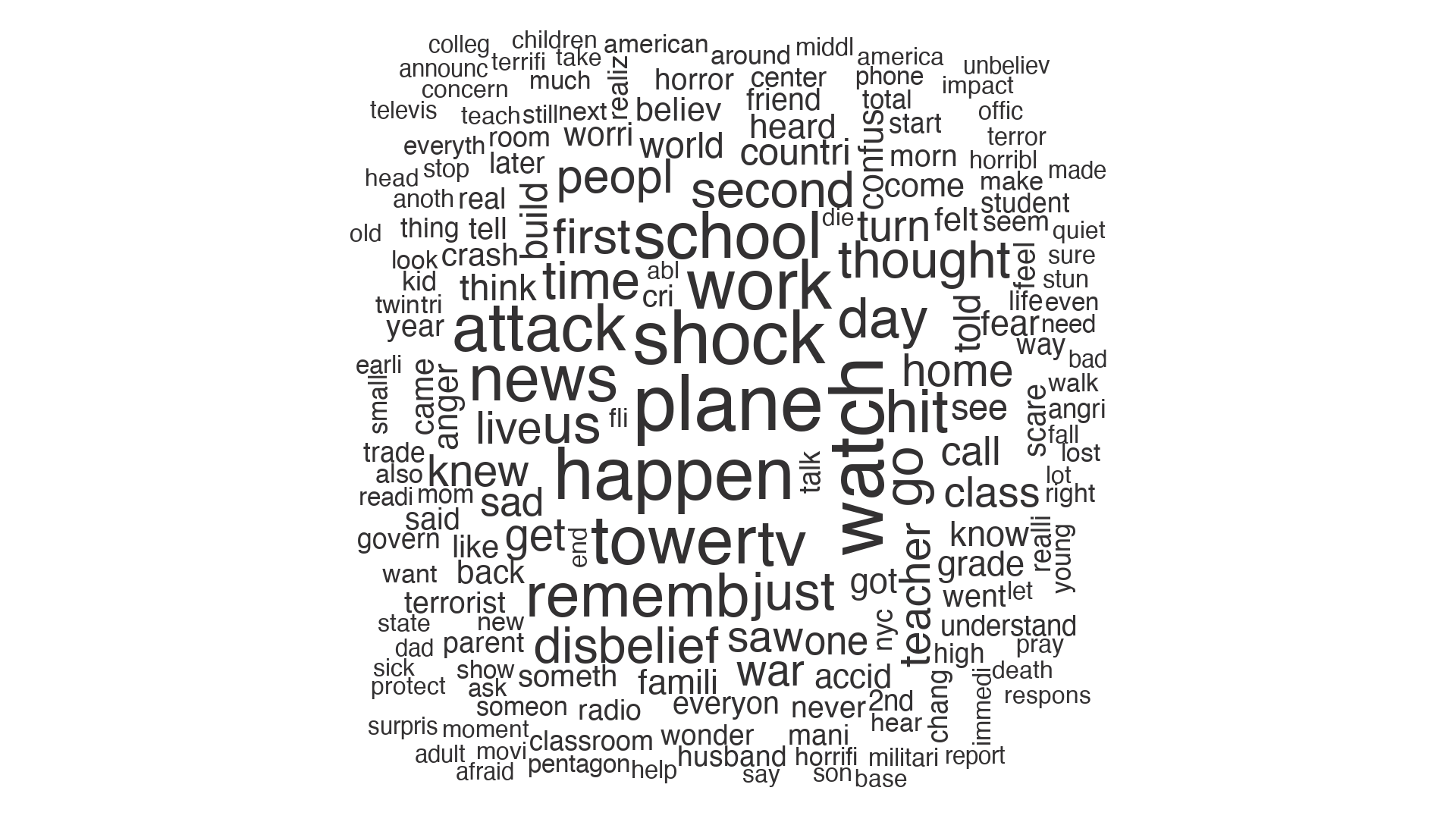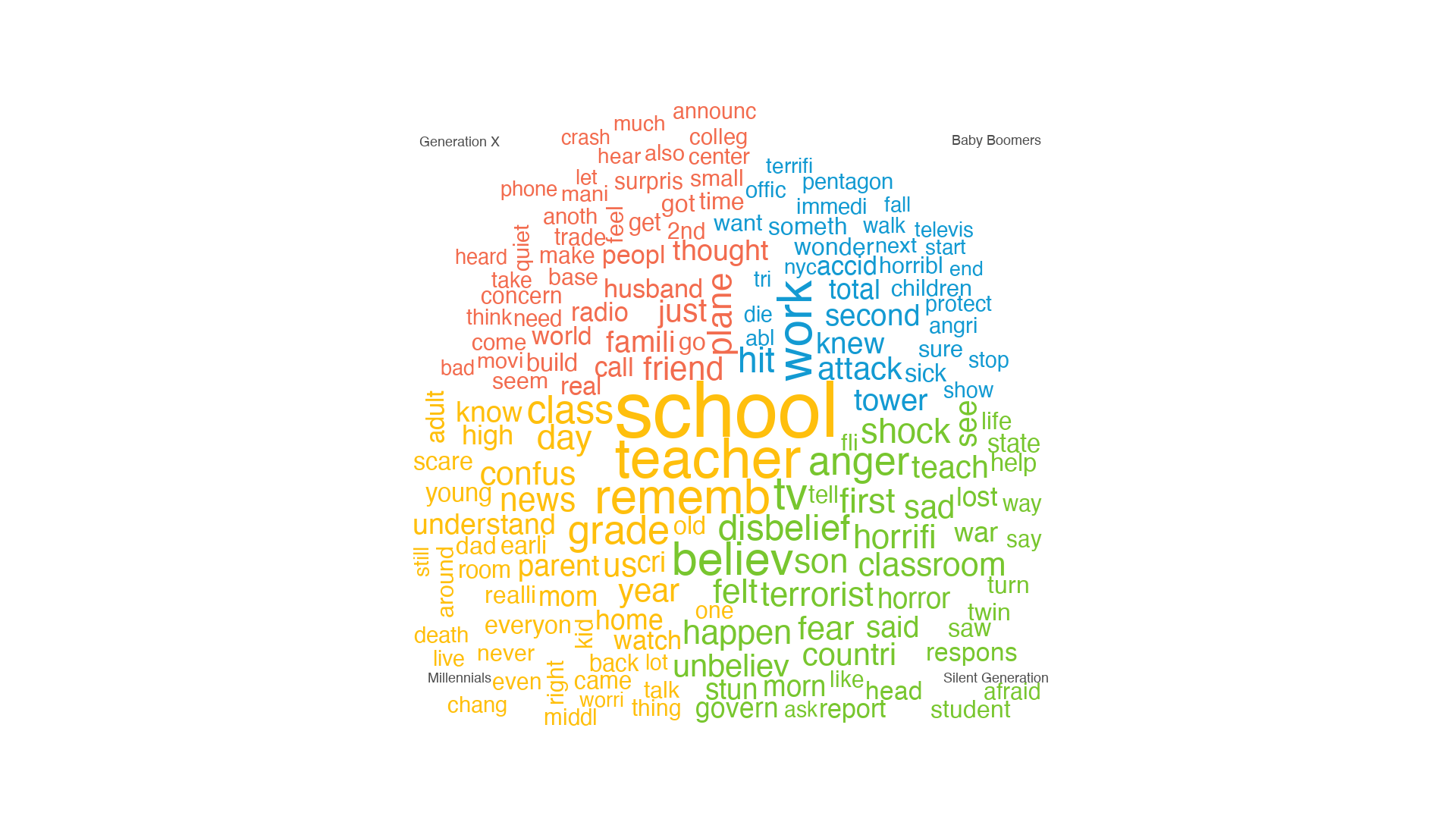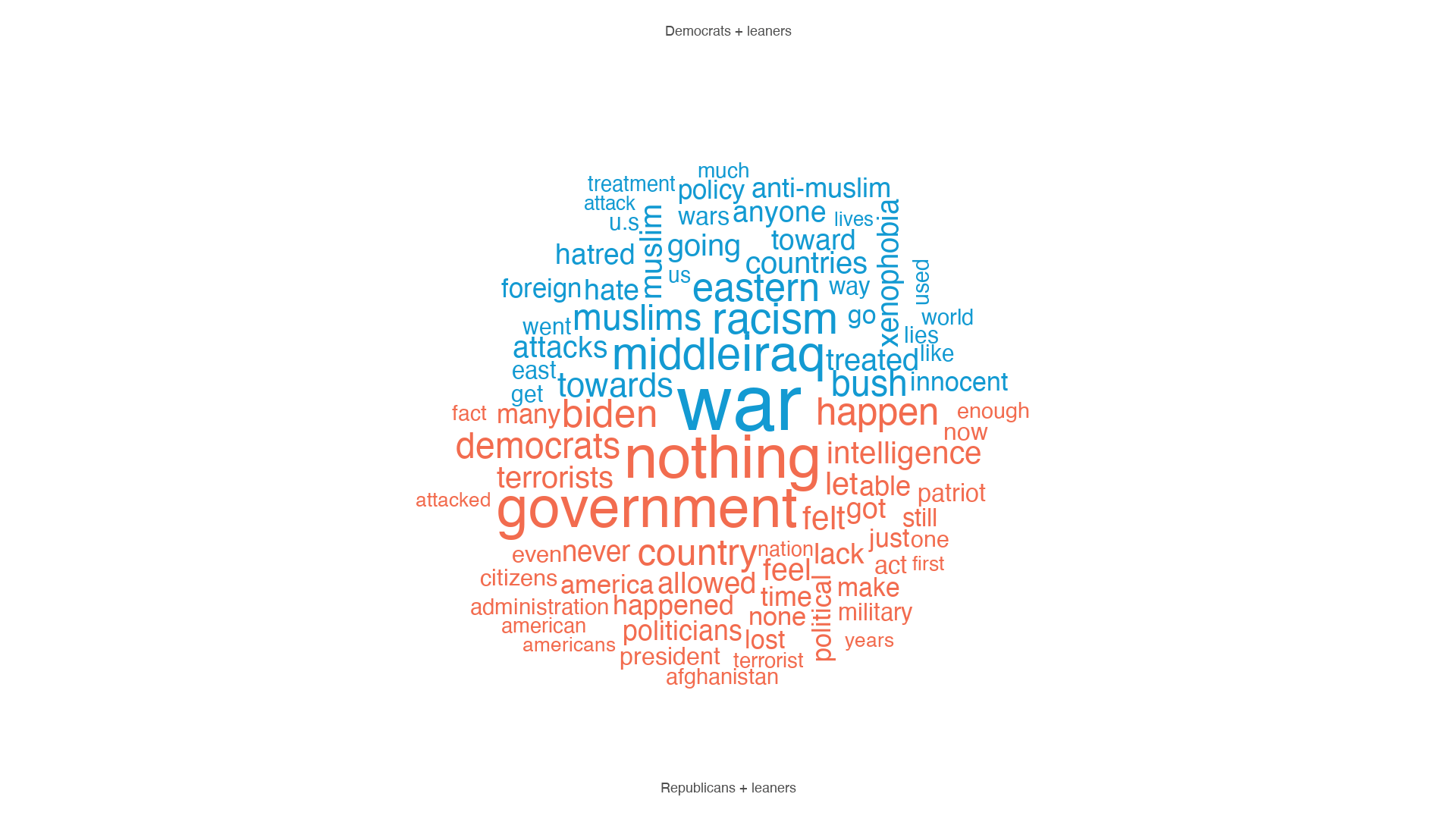Change Research poll of 1,638 registered voters, nationwide, September 1-6, 2021
Twenty years later, the September 11th attacks remain sharp in American voters’ memories. The vast majority of American voters remember exactly where they were when they heard about the September 11th attacks. Most recall the strong emotional impact of the attacks, and most recall the attacks uniting the country. Yet less than a quarter of voters think that the U.S. could be as unified again if something similar happened today, underscoring sharp generational and partisan divides on the lasting impacts of the attacks and the role of the U.S. in the world today.
Remembrance
Nearly all voters born before 1996 (98%) say they remember exactly where they were the moment they heard about the attacks. Six in ten say the attacks moved them or affected them emotionally a great deal. Just 9% say the attacks affected them not much or not at all. This is virtually unchanged since a decade ago—97% of Americans in a Pew 2011 poll said they remembered exactly where they were, and just 6% in 2011 said the attacks affected them not much or not at all.
Voters offer clear, vivid memories:
I was on deployment in Misawa Japan. Just finished watching The Patriot and was listening to the 11pm Far East Network News when they interrupted regular programming. The base went into lock down a short time later. To this day I won’t watch that movie. – Male, white, Republican, 50-64
I was at my desk at work when the twin towers were attacked. It completely broke my heart. My niece was born on Sept 11th and she was in New York celebrating her Birthday. It took us hours to contact her and make sure she was ok. Our employer sent us all out to fill up our gas tanks so we wouldn’t have a problem getting into work the following day. It was a very sad day for our Nation. – Male, African-American/Black, Democrat, 65+

The school setting dominates millennials’ memories, as shown in the cloud below that shows the difference from the mean by generation, as do interpretations or reactions from adults like teachers or parents. Older respondents are more likely to mention work or watching the television

Asked about what they were most proud of in the aftermath of the attacks, nearly half of respondents mentioned how united the country was:
- The inclusion of all Americans made me feel pride. Everyone came together to help anyway they could. – Female, African-American, Democrat, 18-34
- I felt the most pride after the 9-11 attacks when people you would normally not see rallying together pulling together for the same cause. – Male, Hispanic/Latino, independent, 35-49
- the way the country rallied together – Male, white, Republican, 50-64
Most remember the U.S. as being very unified (61%) after September 11th, for a total of 91% who say very or somewhat unified. Republicans are most likely to believe the U.S. was very unified, but belief that the country came together crosses party lines. Just 23% of those who believe the country was unified think that the U.S. could be that unified again if something similar happened today.
Party divides voters on what they felt the most shame about in the aftermath of 9/11, with Democrats most likely to cite entering into wars or racism and Islamophobia while Republicans are more likely to cite the government even letting the attack happen, the recent withdrawal from Afghanistan, or nothing at all.

Impact
Those who were younger at the time of the attacks are most likely to believe that the events of 9/11 had a major impact on the direction of the country. In a closed-ended question, just over a quarter of voters say that the September 11th attacks had the greatest impact on the U.S, while a plurality (36%) says the COVID-19 pandemic has had the greatest impact. In comparison, a small minority cite the 2008 financial crisis (5%) or the decision to go to war in Iraq (4%). 37% of Gen Z respondents say the attacks had the greatest impact, while just 26% of Baby Boomers and 19% of the Silent Generation say so. Pluralities of Gen X, Boomers, and Silents say the pandemic has had the greatest impact.
On the whole, American voters are most likely to believe that life in the U.S. and U.S. foreign policy have changed in a major way as a result of 9/11, in line with polling from 2011, while much fewer say their own personal lives have changed in a major way. Just 21% of voters say that their personal lives have changed in a major way as a result of 9/11. This is highest among Gen Xers (28%), while very few Gen Z respondents (7%) feel personal impact. The voters least likely to have felt personal change are most likely to say that foreign policy has changed: majorities of Gen Z (53%) and millenials (60%) say that U.S. foreign policy has changed in a major way as a result of 9/11.
Terrorism Today
While a large majority say the U.S. government is not doing well reducing the threat of terrorism today, concern about terrorism remains stable compared to previous public polling.
- In 2015, 72% of Americans said that the U.S. was doing either very well or fairly well in reducing the threat of terrorism: that is more than double the 33% who say the U.S. government is doing well today.
- Over two-thirds of respondents say that the ability of terrorists to launch another major attack is the same as or greater than it was at the time of the attacks. This is fairly stable, if slightly more intense in the wake of the withdrawal from Afghanistan: 68% of Americans interviewed by Pew in 2014 said terrorists’ ability to launch an attack was the same or greater.
- One in three say that they are very worried or somewhat worried that they or someone in their family might become the victim of a terrorist attack. This is down in comparison to 2015 polling by CNN/ORC which found 45% of Americans were worried or somewhat worried that they or someone in their family might become the victim of a terrorist attack.
- A 44% plurality believes that the main reason there have been no major attacks on American soil since 9/11 is that America has been lucky so far. Roughly equal proportions believe that this is due to the government doing a good job protecting the country. Democrats are more likely to ascribe success to the government.
Policies
- While Democrats are in multiple places more skeptical of the U.S. war on terror, they are noticeably more positive about post-9/11 domestic policies:
- A 59% majority believes that they have given up personal freedoms over the last two decades to make the country safe from terrorist attacks: this is lowest among Democrats (51%), compared to independents (66%) or Republicans (65%).
- Of those who believe they have given up freedoms, just 19% believe that giving up freedoms has made the country safer: this is higher among Democrats (26%) than Republicans (16%).
- Democrats are more likely than Republicans to believe warrantless government and phone surveillance has made the U.S. safer and more likely than Republicans to believe airport screening measures have made the country safer.
- Democrats are about as likely as Republicans to believe creating DHS has made the country safer
- A plurality of 47% believes giving up freedoms has made no difference, while 27% believe the country is less safe as a result. A belief that the country is less safe peaks among Gen Z (57% less safe) and millennials (33% less safe), compared to 18% of Silent Generation members.
- Voters are more divided when it comes to post-9/11 policies and actions. A few stand out: clear majorities say that airport screening measures, the assassination of Osama bin Laden, and the use of drones have made the U.S. safer. A 45% plurality says the creation of DHS has made the U.S. safer.
- More voters believe that capturing Saddam Hussein, increasing annual defense spending, and creating the prison camp at Guantanamo Bay has made the U.S. safer rather than less safe, but pluralities say that these actions have made no difference.
- More voters say warrantless government phone and internet surveillance, the war in Afghanistan, the war in Iraq, and withdrawal from the Iran nuclear agreement have made the U.S. less safe than safer.
- There is little confidence in wars in the Middle East, despite the widespread belief that drone usage has improved national security:
- Most voters say the war in Iraq was not worth fighting (64%) and that the U.S. made the wrong decision (51%). Most also say the war in Afghanistan was not worth fighting (59%), and a 46% plurality says the wrong decision was made in using military force in Afghanistan. The vast majority of Democrats say that the wars were not worth fighting and that the wrong decisions were made. Generation Z are the least likely generation to believe the wars in Iraq and Afghanistan were worth fighting.
America in the world today
- On the whole, voters are slightly more likely to support staying away from intervention in issues around the world: a 48% plurality say that the best way for the country to avoid problems like terrorism is to not get too involved with national problems, while 31% saying we should be very much involved in solving international problems. This is down compared to Pew in 2001 (61% think we should be very much involved) or 2002 (53% very much involved), or even more recently, a CNN/ORC poll in 2015 that found that 45% said we should take the leading role in trying to solve international problems and 54% said we should not.
- There is not much of a partisan divide here: a 45% plurality of Dems and 52% majority of Republicans think we should not get too involved.
- There are clear generational lines: 38-39% of Boomers and Silents say we should be very much involved, down to 28% of Millenials and Gen X, down to 19% for Gen Z.
- There is a similar generational divide on the use of military force and concerns of civilian casualties, while the generational divide is more muted on military presence overseas.
